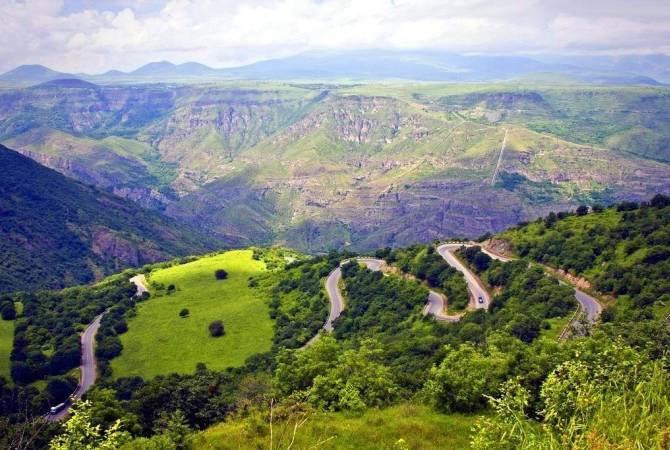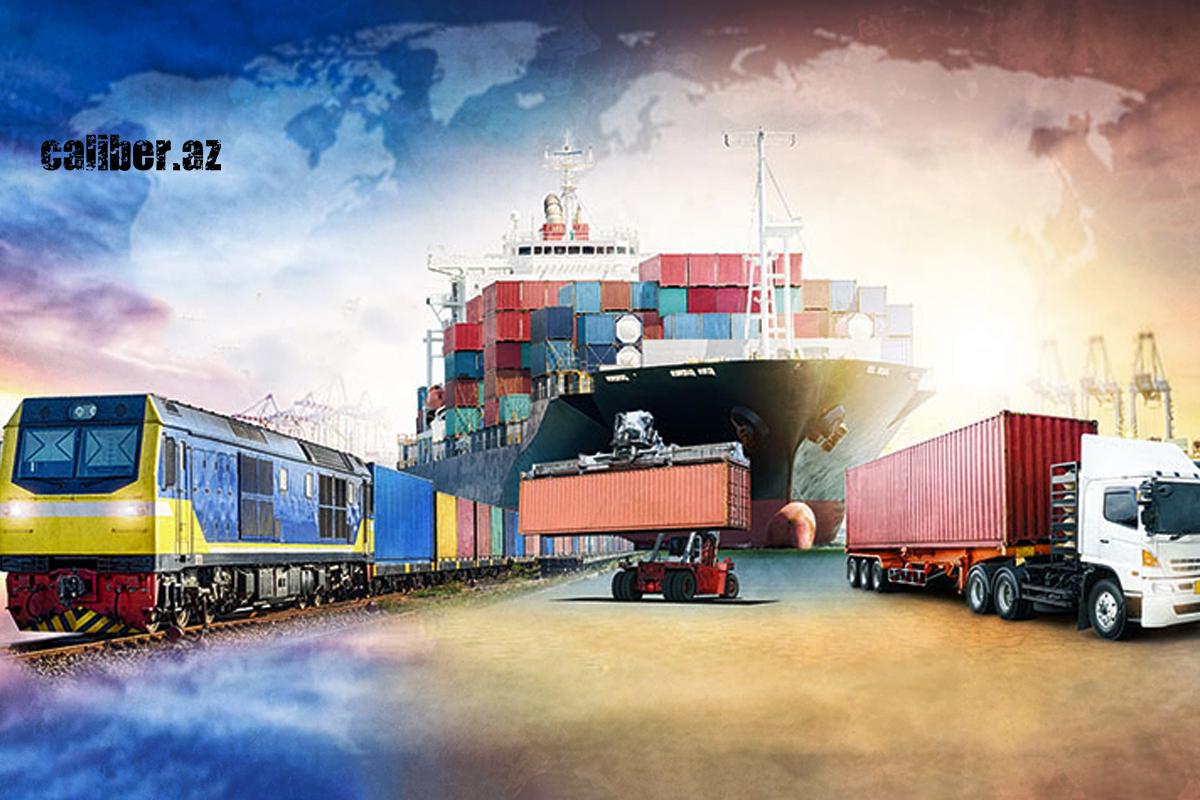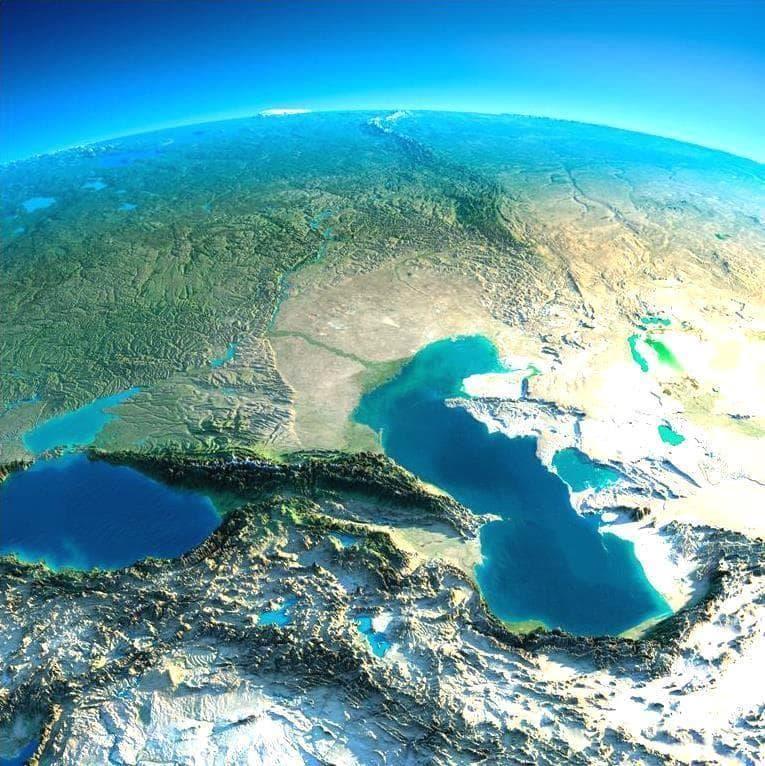Europe - at war, South Caucasus developing Belarussian Doctor of Political Sciences Serhey Bohdan’s exclusive article for Caliber.Az
Today the South Caucasus looks like complete antipode of Europe shaken by crises, strife and war. It is moving towards rapprochement by opening borders and laying new roads connecting countries and regions. However, the efforts of the Caucasian countries are still threatened by the consequences of global political conflicts. The crisis related to the supply of Kazakh oil to the West testifies to this.
Caucasus as a "window to the world" for Russia
The first trilateral meeting of the foreign and transport ministries of Azerbaijan, Türkiye and Kazakhstan was held on June 27, 2022. The ministers of the three countries adopted the Baku Declaration, outlining their vision of the use of transport routes being built and restored in the region. Although the exact timing of their launch has not been named yet, Azerbaijan, Kazakhstan and Türkiye are already achieving tangible success in building transport corridors and in restoration of existing transport routes in the region.
In particular, after the Baku meeting, Türkiye and Armenia had taken another decisive step to overcome three decades of break in relations. During the fourth round of talks, the special representatives of Ankara and Yerevan agreed to open a joint border for citizens of third countries and start direct air cargo transportation. The Türkiye-Armenia passenger flights were launched in February 2022.
These steps will give new dynamics to the development of not only Türkiye and Armenia but the entire region. Such an example can be mentioned. The planned opening of the Turkish-Armenian border will create an additional transport corridor from Russia to the Middle East (and to Türkiye). Until now, the corresponding cargo transportation depended on the only route that ran through the Georgian Upper Lars [checkpoint].
If Moscow begins to develop an alternative route through Azerbaijan, Armenia and the opened Turkish-Armenian border to the Middle East, then one should not consider this as an anti-Georgian line. The current Georgian government has not joined the sanctions against the Russian Federation and refrains from radical steps in connection with the Russian-Ukrainian war. Upper Lars is overloaded due to increased cargo traffic, and the lack of alternatives is especially acute in winter, when this transshipment point sometimes stops operating due to weather conditions.
Did war force?
On the one hand, the new decisions of Ankara and Yerevan to open the routes looked unexpected. The three previous rounds of negotiations were ineffective, and the sides did not express optimism about the fourth one.
However, on the other hand, the general logic of the development of relations among the regional countries at the current stage and the strengthening of the role of the regional countries themselves in terms of reconstruction gradually pushed the participants in the negotiations, and in particular, Yerevan, to seek a compromise.
However, the position of Moscow, which has begun to actively contribute to the restoration of routes in the Caucasus, has also changed. Armenian Deputy Prime Minister Mher Grigoryan stated in an interview with TASS on June 28, 2022 that "the working group of the deputy prime ministers of Armenia, Azerbaijan and Russia on restoration of regional routes was able to bring the positions of Yerevan and Baku closer on many issues, in particular, border and customs control, as well as security movement of citizens, vehicles and cargoes by roads and railways through Armenia and Azerbaijan". This happened, apparently, on the sidelines of the economic forum held in Russia’s St. Petersburg city in mid-June 2022. Moscow has clearly decided to get involved in the process of reintegration of the historically united region between the Caspian and Black Seas. The information published by Russia's Izvestia newspaper, citing a "high-ranking source" that "Russia helped Armenia and Azerbaijan agree on a highway in the Zangazur corridor in early June 2022 and only a small 6 kilometre-section should be agreed" testified to this.

The issue is the most key transport corridor, which will allow restoring roads along the shortest route between the main part (Azerbaijan) and the Nakhchivan Autonomous Republic of Azerbaijan. As for the railway corridor to Nakhchivan, Azerbaijan and Armenia agreed it in autumn 2021.
Russia's activity in the South Caucasus has intensified due to the growing Russian-Ukrainian war. The chronology of events testifies to this. An agreement in principle on restoration of regional routes was reached at a meeting of the leaders of Azerbaijan, Russia and Armenia in Moscow on January 11, 2021, when they created a working group at the level of deputy prime ministers of the three countries, which was tasked with establishing transport and economic ties in the Caucasus.
However, Russia stepped up its efforts in this direction only when its relations with the West began to ruin. When Russian President Vladimir Putin and Foreign Minister Sergei Lavrov closed the routes to Europe for Russia, which was losing sea routes through the Baltic and the Black Seas, Russia wondered how to travel, fly and sail to other countries and how to transport cargo. Türkiye began to play a significant role for Russia as the most important transportation route in the western direction. However, its full-fledged use is objectively possible only through the reintegration of the South Caucasus. There is nothing ideological in this process, just geography.
"Iron Curtain" between Europe and China
Not only Moscow is interested in restoring routes in the South Caucasus. There is "Iron Curtain" on the European continent from the Barents to the Black Seas, the consequences of this are global in nature and are not limited to the "squeezing" of the Russian Federation from Europe to Asia. One of the disastrous results of the confrontation was the emergence of bigger obstacles on the routes between the two global economic centres - Europe (EU) and East Asia (primarily China), threatening to destroy the overland route between them along the shortest one, built with such difficulty in 2010s.
It is possible to "bypass" Russia, first of all, through the South Caucasus. In this regard, it is hard to disagree with Caliber.Az economic observer Khazar Akhundov, who has recently noted that Azerbaijan's Alat and Kazakhstan's Aktau ports are advantageous as a result of the latest re-routing on the continent.
No matter how often people talk about the Russian-Chinese "alliance", but China began laying transit rail routes to Europe, bypassing Russian territory, even on the eve of the Russian invasion in Ukraine. Meanwhile, earlier Chinese cargoes were mainly transported through Russia. Some 1.1 million TEUs (conventional units for measuring the capacity of freight vehicles) out of 1.46 million TEUs were transported by the Russian railway from China to Europe in 2021. Around 3,000 TEU were transported along the TRACECA transport corridor through the Caspian Sea, Azerbaijan, Georgia from January through February 2022 which is by third more than last year. The first train from Chinese Xi'an to Germany was running bypassing Russia along a new land-sea route crossing the Caspian and Black Seas through Kazakhstan, Azerbaijan, Romania, Hungary, Slovakia and the Czech Republic in April 2022.

Experts consider the main obstacle to the growth of transportation through the Caspian Sea the underdevelopment of infrastructure and the lack of proven contractors. "If they [Azerbaijan and Kazakhstan] create normal logistics there, and taking into account such prices, I think this will be a quite affordable route, we can get some volumes to be transported bypassing Russia," deputy director general of Russian Railways Aleksey Shilo said. He added that to counteract these trends, Russian Railways even began to increase transportation through the Azerbaijani Samur border crossing on the border with the Russian Federation to "load the Azerbaijani railway infrastructure with the Russian, transit, Azerbaijani, Iranian cargo for other cargo to be less transported".
The EU adheres to the same logic of ensuring routes with China. As opposed to the US, it does not intend to escalate the conflict with China. For this purpose, the EU needs a path in the southern direction from the Caucasus Mountains. The meeting between Azerbaijani President Ilham Aliyev and Armenian Prime Minister Nikol Pashinyan in Brussels in May 2022, mediated by President of the European Council Charles Michel, testified to this EU position.
Following the meeting, Michel issued a three-point statement that outlined the priorities of Brussels as clearly as the priorities of the two South Caucasian countries. The second issue in the statement was the issue of restoring routes in the South Caucasus. Even Russian politicians recognise the role of European mediation in restoring routes in the Caucasus.
Baku's position: not to wait
However, it would be fundamentally wrong to link the breakthrough in reopening routes in the region with the role of Moscow or other players. Moscow and, to a lesser extent, the West play prominent roles in this process, however, they rather follow the trends set by the regional countries. Türkiye and Azerbaijan have the greatest activity in process. Azerbaijani analyst Farhad Mammadov notes that after the 2020 war, Baku "seeks to move to a post-conflict period, which implies a refusal from the conflict logic". He added that the first element that has been discussed in this regard over the past year and a half, is the restoration of routes in the region, rather than the delimitation of borders or a peace treaty.
In fact, one of the points is "restoration and construction of transport corridors" in the list of five principles of the peace treaty presented by the Azerbaijani side in March 2022. Yerevan agreed with all the points, which is not surprising. The restoration is beneficial not only to Azerbaijan, but also to other countries, primarily Armenia.
Azerbaijani Foreign Minister Jeyhun Bayramov, at a meeting with his Russian counterpart Sergei Lavrov on June 24, 2022 noted that the biggest progress in the negotiations between Baku and Yerevan had been achieved in relation to the restoration of routes. Moscow's Izvestia quoted a similar assessment expressed by the newspaper's sources within the Russian authorities, saying that despite "rather harsh political statements from both sides, a constructive dialogue on the transport corridor has been established between Baku and Yerevan, mediated by Moscow".
Taking into account that Yerevan sometimes delays the process of resolving issues, Baku looked for alternatives and signed a memorandum of intent with Tehran in March 2022 to build a road from the East Zangazur economic region of Azerbaijan to Nakhchivan through Iran.
"Despite this option would cost really more than a road through Armenia, Azerbaijani President Ilham Aliyev was ready for this action if Armenian Prime Minister Nikol Pashinyan continued to drag out the process,” Izvestia reported, adding that this prompted the Armenian side to compromise.
Baku demonstrated its readiness to resolve issues, not putting up with dragging out negotiations in railway transportation. Azerbaijan completed constructing the Julfa-Ordubad branch, adjacent to the Armenian territory from Nakhchivan’s side in May 2021, having built about 100 km of lines in total. Armenia only allocated funds for geodetic work preceding the construction of its part of the Yeraskh-Julfa-Ordubad-Meghri-Horadiz railway in March 2022. It is assumed that 45 km of new tracks should be built there.
Another important aspect of Baku's policy is its clearly visible desire to build a special legal regime on the restored routes passing through Armenian territory. It is required to prevent extremist forces from disrupting routes again (if they could capture even the regiment of the patrol service in Yerevan recently, then there is no doubt that they can commit sabotage on the roads), as well as to remove absurd customs barriers during transportation between the two Azerbaijani regions. Azerbaijani experts draw a parallel between the future Zangazur corridor and the legal regime that existed until recently in relation to transportation between the main part of Russia and the Kaliningrad region through Lithuania. The Armenian side objects to the special legal regime, accusing Baku of seeking to create a "new geopolitical reality on the territory of the Syunik region (i.e. Zangazur)".

Owners of their region and their future
While summing up, it is possible to say that following less intervention of external actors, who were clearly distracted by events in Eastern Europe, positive dynamics of development in the political and socio-economic spheres increased in the Caucasus region. The processes based on intra-regional factors usually turn out to be more constructive for the affected countries and peoples than the processes associated with external forces external in connection with the corresponding region. Once these ideas formed the basis of the philosophy of the Non-Aligned Movement, which includes Azerbaijan.
However, if global players are now busy with other regions and issues, this does not mean that global politics cannot once again have a destructive impact on Azerbaijan and its neighbouring countries, especially drawing the regional countries into a confrontation between Russia and the West. The crisis around the export of Kazakh oil, which has been recently broken out, can be mentioned as an example.
A local court in Russia's Novorossiysk city ordered on July 6, 2022 to suspend the activity of the marine terminal located in the Russian city for one month, which is the end point of the Caspian Pipeline Consortium's oil pipeline.
This is an important step as this route is the main one for Kazakhstan's oil export. Thus, the supply of Kazakh oil to the West through Russia was limited for the third time since the beginning of the Russian-Ukrainian war.
Formally, the court suspended the activity of the terminal due to environmental breach, however, this happened after the Kazakh Finance Ministry published a draft decree effectively banning the supply of goods to Russia and Belarus that fell under Western sanctions. During a conversation with President of the European Council Charles Michel, President of Kazakhstan Kassym-Jomart Tokayev suggested using Kazakhstan's "hydrocarbon potential" to "stabilise the situation on the world and European markets", in other words, to replace Russian energy sources in the West.
In other words, the future for the countries of the South Caucasus does not look cloudless and fraught with many dangers, however, the positive consequences of restoring routes in the region can hardly be overestimated.
Azerbaijan and neighbouring countries will be able to transform immediately, rushing forward in the economic field, overcoming conflicts and returning to a common historical heritage. This will inevitably happen if routes are restored, after which many extremist great power and separatist projects will be futile.








